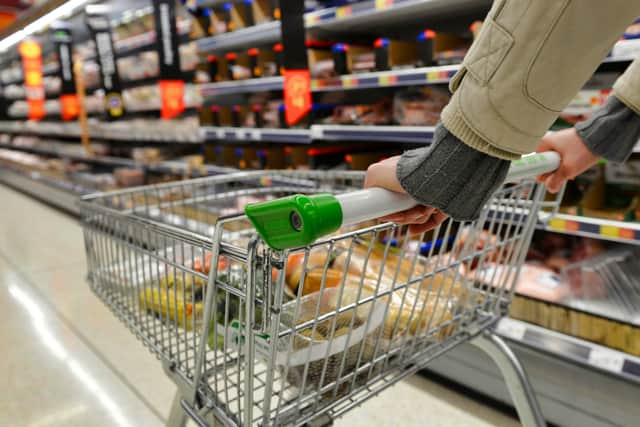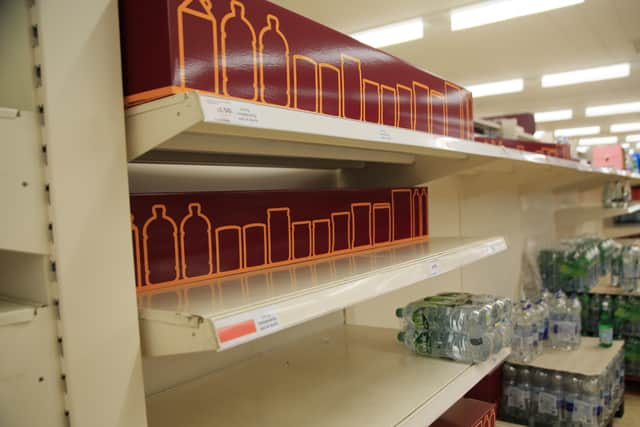Food shortages UK: Why supermarkets hate empty shelves - and the tricks they use to hide them
This article contains affiliate links. We may earn a small commission on items purchased through this article, but that does not affect our editorial judgement.
and live on Freeview channel 276
The Covid-19 pandemic and Brexit have produced some serious headaches for supermarkets.
While sales have grown, thanks to the numerous lockdowns, supply chains have struggled due to a lack of delivery drivers and shorter-term issues, like panic-buying and the fuel crisis.
Advertisement
Hide AdAdvertisement
Hide AdIt means their ability to offer the same wide range of products as they did before the pandemic has been compromised, while even keeping stores fully stocked has become a major challenge.
“The UK shopper and consumer could have previously expected just about any product they want to be on the [supermarket] shelf or in the restaurant all the time,” Ian Wright, the boss of food industry trade body Food and Drink Federation, said in September.
"That's over. And I don't think it's coming back."
But given these issues are public knowledge, why have supermarkets been trying to disguise empty shelves? And how do they go about trying to do it?
Here’s what you need to know.


Why supermarkets hate empty shelves
NationalWorld spoke to Lydia Gerratt, a former senior food buyer at a major UK supermarket, to hear why retailers hate having empty shelves.
Advertisement
Hide AdAdvertisement
Hide AdBuyers are essentially the nerve centre of all supermarket operations.
Put simply, it’s their job to choose which products make it into stores and in what quantities.
“From a buyer’s perspective, the worst thing possible was to have an empty shelf,” Gerratt says.
“We would look at the shelf as generating profit for the business - no product on the shelf means no sales, and no profit.
Advertisement
Hide AdAdvertisement
Hide Ad“If we heard from our distribution team that a delivery hadn’t arrived and we were out of stock, we would be straight on the phone to the supplier because without products on the shelf there wouldn’t be any profit.”


While profit is a key aspect for any business, reputation is also a major consideration.
And, according to Gerratt, supermarkets are very conscious of how they are seen by shoppers.
“On the selling side, it’s all about the shopping environment - gaps on the shelf give the worst impression to customers,” she says.
Advertisement
Hide AdAdvertisement
Hide AdBut given their supply chain issues have been headline news, some retail experts think there might be more leeway than usual for retailers at the moment.
Bryan Roberts, analyst at Shopfloor Insights, says that in more usual times, “shoppers might get disenchanted and go elsewhere” if shortages persisted.
However, Roberts tells NationalWorld he believes the public are “aware that it’s not entirely the retailers’ fault”.


What are supermarkets doing to hide gaps?
The extent of the supply chain issues has meant that, try as they might, supermarkets have had to put up with some gaps in stores.
Advertisement
Hide AdAdvertisement
Hide AdThings aren’t as bad as they were at the height of panic buying in the first lockdown, when supermarkets looked more like zombie apocalypse film sets than real-life shops.
But they are certainly not where any of the major retailers want them to be, with almost all supermarkets experiencing gaps of one kind or another.
It has led Tesco and Sainbsbury’s to try to cover up shortages in some stores with cardboard cut-outs, moves that have drawn ridicule on social media and demonstrate that supermarkets “must be desperate,” according to Gerratt.
While this method of hiding gaps was perhaps a little clunky, supermarkets have many other tricks up their sleeves, according to Roberts.
Advertisement
Hide AdAdvertisement
Hide Ad“The compromise tactic is to fill empty bays with booze,” he says.
“But you can only spread product about so thinly.
“Tesco has filled up bays in its chilled section with large cardboard signage to talk about the provenance of their produce.
“It fills up an entire bay without the need to move products around too much, which saves time for store operatives.”
Roberts points to similar tactics in Asda and Sainsbury’s, the latter of which has put up “information panels on why things like cereal are good for you”.
Advertisement
Hide AdAdvertisement
Hide AdAsda has gone a little more high-tech than cardboard signage, with the supermarket installing digital screens in some of its aisles.
But while these measures undoubtedly fill shelf space, Roberts doubts whether they bring any extra sales “because most shoppers are on auto-pilot when shopping” and therefore, aren’t as susceptible to marketing.
Another method seen in some bigger stores is to give floorspace over to other businesses.
For example, sports retailer Decathlon has space within Tesco and Asda stores, while sushi chain Yo! has food kiosks in more than 300 Sainsbury’s shops across the country.
Advertisement
Hide AdAdvertisement
Hide AdBut ultimately, what all of these tactics show is that “stores are too big,” Roberts says.
So maybe we can expect the places we shop in to become a little smaller in the future.
A message from the editor:
Thank you for reading. NationalWorld is a new national news brand, produced by a team of journalists, editors, video producers and designers who live and work across the UK. Find out more about who’s who in the team, and our editorial values. We want to start a community among our readers, so please follow us on Facebook, Twitter and Instagram, and keep the conversation going. You can also sign up to our email newsletters and get a curated selection of our best reads to your inbox every day.
Comment Guidelines
National World encourages reader discussion on our stories. User feedback, insights and back-and-forth exchanges add a rich layer of context to reporting. Please review our Community Guidelines before commenting.
